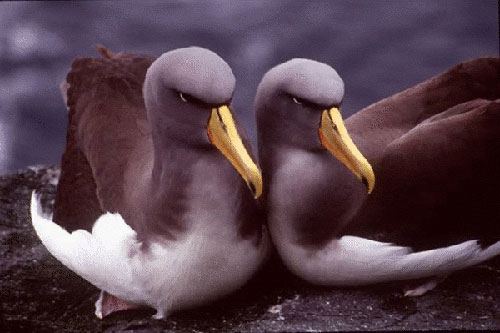Lorna Deppe (School of Biological Sciences, Canterbury University, Christchurch, New Zealand) and colleagues have published in the journal Marine Ecology Progress Series on at-sea GPS tracking of Chatham Albatrosses Thalassarche eremita.
The paper’s abstract follows:
“The analysis of environmental characteristics to explain the distribution of endangered seabirds can aid in the identification of important areas at sea and lead to more effective conservation. We used high resolution Global Positioning System (GPS) tracking data to study the at-sea patterns of chick-rearing Chatham albatrosses Thalassarche eremita across 3 years (2007, 2008 and 2009) in relation to bathymetry, slope, sea surface temperature (SST) and chlorophyll a (chl a) concentration. Birds mostly foraged within 400 to 600 km of their colony, located within the southeastern part of New Zealand’s continental shelf, the Chatham Rise. Despite little spatial overlap across years, foraging areas were predominantly associated with waters of less than 2500 m depth, slopes of 1 to 4°, SST between 15 and 16°C, and chl a concentrations >1 mg m-3 in all years. According to boosted regression tree models, no single habitat variable particularly explained the spatial occurrence of foraging areas. However, bathymetry was of higher relative importance in 2008 and 2009, while chl a was relatively more important in 2007, a year of increased primary productivity. Our results suggest that chick-rearing Chatham albatrosses rely on resources that are generally predictable in location, but that they also respond to fine-scale changes within their foraging environment. Incorporating such dynamics into conservation planning might be best addressed by mitigating incidental bycatch in fishing operations, as well as implementing a protected area southeast of the breeding site, which we identified as a key foraging zone.”

Chatham Albatrosses, photograph by Graham Robertson
For an ACAP Latest News item on Lorna’s PhD on Chatham and other albatrosses click here.
Reference:
Deppe, L., McGregor, K.F., Tomasetto, F., Briskie, J.V. & Scofield, R.P. 2014. Distribution and predictability of foraging areas in breeding Chatham albatrosses Thalassarche eremita in relation to environmental characteristics. Marine Ecology Progress Series 498: 287-301.

 English
English  Français
Français  Español
Español